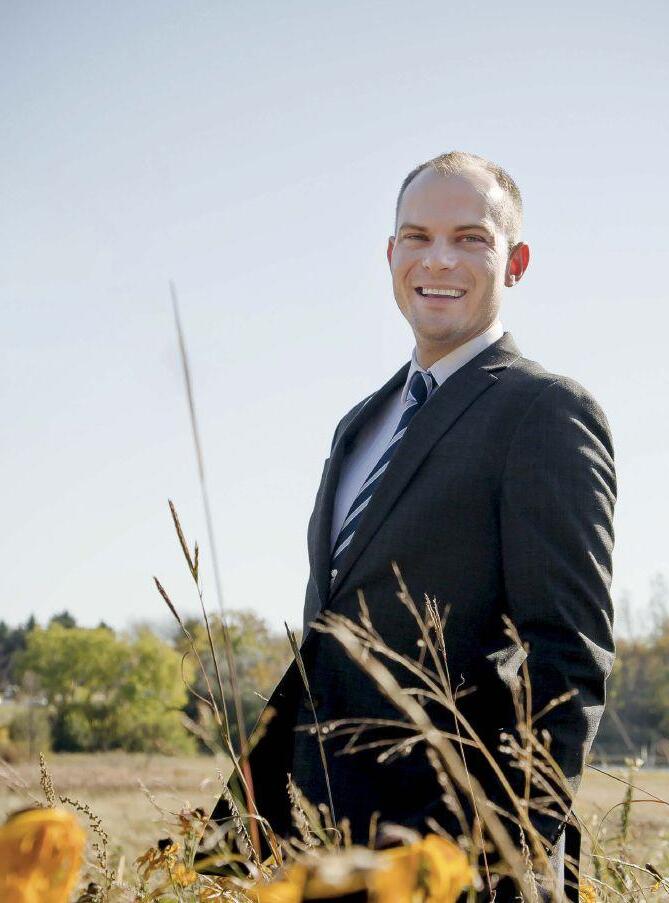
2 minute read
Channeling the entrepreneurial mindset
By Matthew Borcherding
FERGUS FALLS, Minn. – Bob Dylan said it best in “The Times They Are A-Changin’ ” when he sang, “And keep your eyes wide. The chance won’t come again.” In essence, Dylan defined the entrepreneurial mindset: Keep your eyes open for opportunity, and take quick, decisive actions and calculated risks.
Our world will no longer wait for innovation to bubble up out of the ground. Instead, innovation and growth need to become ways of thinking, because when they do, stagnancy of thought is replaced by dynamic and revolutionary ideas.
Both higher education and the private sector have a prime opportunity to transform the way we do business. And the time is now.
As an educational administrator, I am keenly aware of the demands on the 21st century global citizen. Our students are constantly connected to others across the globe, which means that now more than ever, we need to prepare them in both the traditional disciplines and global citizenry.
But to do so, we must teach our students not only to be bold and to think outside of the box, but also to develop skills to forge relationships outside of the internet.
Further, we must keep developing in students the critical thinking skills that leaders in business and industry crave.
Those leaders are desperate for graduates who are adept at thinking independently, as well as at generating both big ideas and progressive innovation. While some may say that the newest graduates are not prepared for the workforce, I would argue that that they are ready to change the workforce to meet the needs of the 21st century.
To make that change, educational and business leaders alike will need to hone and develop their own entrepreneurial mindsets.
Being an entrepreneur means more than inventing new products or redeveloping systems. When I was still teaching, I often encouraged my students to look beyond the obvious for solutions, and I reminded them that anyone can look up facts and figures in seconds.
What they needed, more than anything, was free rein to think independently of the constructs in which we bind ourselves so often.
Using that framework, I found that students could develop new and cogent ideas that had strong implications for the future. During an environmental science course, for example, I asked students to address a real-world issue and develop a method to reduce nutrient pollution in a nearby lake. I stipulated that limited resources were available to solve the problem.
Aside from that, I tried to let the students’ creativity run free – and the results and suggestions were astounding.
We need to inspire our young people to develop this mindset by encouraging the following five basic tenets:
Failure is acceptable. No one in history got it right the first time. Embrace change. The status quo will not take us further into the future.
Be fearless and optimistic. Hope is a powerful emotion that can guide us all.
Be decisive. It’s OK to act to get results.
Think big. Do not let your imagination be stymied by established social constructs.
If we all embrace these tenets and in whatever career we choose, the result will dramatically move our society forward.
Higher education and modern business are at a critical juncture, and we in those fields must spot opportunities and act on them before they vanish. I urge regional business and education leaders to harness the power of the fresh and innovative thinking of today’s generation.
Entrepreneurialism is more than a concept; it is a way of thinking. The times they are a-changin,’ and we all must be prepared to adapt to those changes with our eyes wide open for opportunity and growth.
Dr. Borcherding is the dean of liberal arts and sciences at Minnesota State Community and Technical College. He is a former biology faculty member at M State.
He’ll be speaking on the topic of ‘The Entrepreneurial Mindset’ at the MNWest CEO Forum & Entrepreneur Summit, an event that will be held Nov. 7 at Minnesota State Community and Technical College in Fergus Falls, Minn. PB













